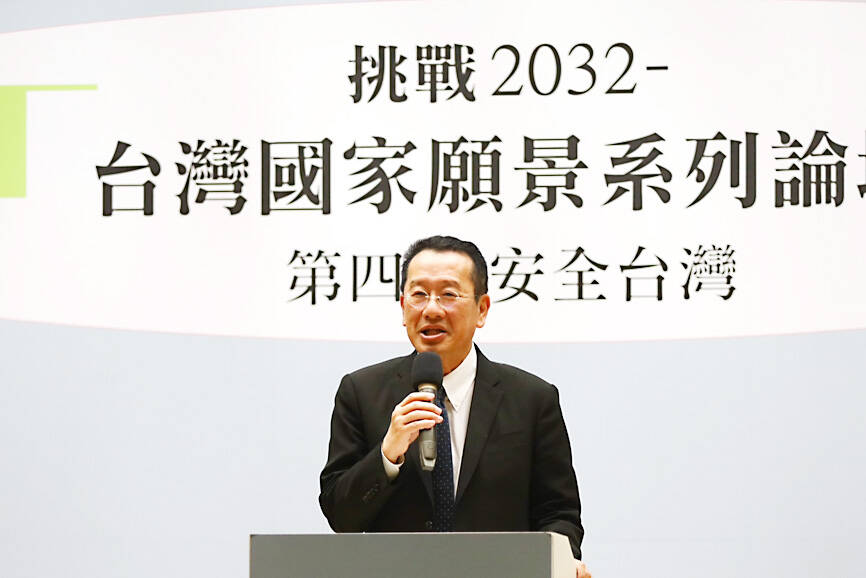Taiwan is facing more frequent, sophisticated and concealed cognitive warfare a month ahead of the presidential election, National Security Council Secretary-General Wellington Koo (顧立雄) said yesterday.
It is China, not Taiwan, that does not accept the “status quo” of peace and stability in the Taiwan Strait and is pushing cross-strait relations to the brink of war, Koo told a forum held by Taiwan Think Tank in Taipei.
China “has made no secret” of its ambition to annex Taiwan, continuing to harass the nation with military and economic coercion, diplomatic isolation, cyberattacks and cognitive warfare, he said.

Photo: CNA
Beijing has been carrying out such operations in a planned manner in an attempt to divide and isolate Taiwan, and weaken Taiwanese unity and the will to resist, he said.
Freedom in Taiwan is facing serious threats as the nation’s presidential and legislative elections draw near, he said.
Nonetheless, Taiwan’s seemingly fragile democratic system is resilient, bringing its economic power onto the global stage with the innovative efforts enabled by an open capitalist society, he said.
Sharing common values with the world’s democratic camp, Taiwan is committed to maintaining the “status quo” in the face of uncertainty and potential geopolitical risks, he said.
Taiwan has also considerably raised its visibility worldwide as a force for good, he said, adding: “We are not alone.”
China’s ambitions to expand its influence challenge the international order and affect not only Taiwan, but also countries such as Japan, the Philippines and India, he said.
Countries in the Americas, Asia and Europe have abandoned the “unrealistic illusion” that political reform would occur alongside market opening and economic development in China, he said.
The US and its allies are well aware that Chinese President Xi Jinping (習近平) “plays by no rules” and that the Chinese military buildup cannot be ignored, he said.
To manage the risks, the US is trying to maintain high-level dialogue with China while working with allies to strengthen deterrence, he said.
Research by a foreign think tank shows that if a cross-strait conflict breaks out, the initial stage of a blockade of Taiwan could cause global economic output to fall by up to US$2 trillion, he said, adding that the actual losses could be astronomical and difficult to estimate.
As the second-largest economy in the world, China would suffer the largest losses from this global economic disaster, which is likely to lead to a collapse of an already-weak Chinese economy, he said.
The Chinese threat Taiwan is facing is a global threat as peace and stability across the Taiwan Strait are crucial to global security, he said.
The US is increasingly focusing its military in the Indo-Pacific region, while Japan has boosted its national defense budget and troops on the Nansei Islands, and the Philippines has expanded its defense cooperation with the US, he said.
Taiwan must have the determination to stand together with the international community and jointly build a credible and effective deterrent, he said.

The Chinese Communist Party (CCP) is pushing for residents of Kinmen and Lienchiang counties to acquire Chinese ID cards in a bid to “blur national identities,” a source said. The efforts are part of China’s promotion of a “Kinmen-Xiamen twin-city living sphere, including a cross-strait integration pilot zone in China’s Fujian Province,” the source said. “The CCP is already treating residents of these outlying islands as Chinese citizens. It has also intensified its ‘united front’ efforts and infiltration of those islands,” the source said. “There is increasing evidence of espionage in Kinmen, particularly of Taiwanese military personnel being recruited by the

ENTERTAINERS IN CHINA: Taiwanese generally back the government being firm on infiltration and ‘united front’ work,’ the Asia-Pacific Elite Interchange Association said Most people support the government probing Taiwanese entertainers for allegedly “amplifying” the Chinese Communist Party’s propaganda, a survey conducted by the Asia-Pacific Elite Interchange Association showed on Friday. Public support stood at 56.4 percent for action by the Mainland Affairs Council and the Ministry of Culture to enhance scrutiny on Taiwanese performers and artists who have developed careers in China while allegedly adhering to the narrative of Beijing’s propaganda that denigrates or harms Taiwanese sovereignty, the poll showed. Thirty-three percent did not support the action, it showed. The poll showed that 51.5 percent of respondents supported the government’s investigation into Taiwanese who have

South Korean K-pop girl group Blackpink are to make Kaohsiung the first stop on their Asia tour when they perform at Kaohsiung National Stadium on Oct. 18 and 19, the event organizer said yesterday. The upcoming performances will also make Blackpink the first girl group ever to perform twice at the stadium. It will be the group’s third visit to Taiwan to stage a concert. The last time Blackpink held a concert in the city was in March 2023. Their first concert in Taiwan was on March 3, 2019, at NTSU Arena (Linkou Arena). The group’s 2022-2023 “Born Pink” tour set a

A Philippine official has denied allegations of mistreatment of crew members during Philippine authorities’ boarding of a Taiwanese fishing vessel on Monday. Philippine Bureau of Fisheries and Aquatic Resources (BFAR) spokesman Nazario Briguera on Friday said that BFAR law enforcement officers “observed the proper boarding protocols” when they boarded the Taiwanese vessel Sheng Yu Feng (昇漁豐號) and towed it to Basco Port in the Philippines. Briguera’s comments came a day after the Taiwanese captain of the Sheng Yu Feng, Chen Tsung-tun (陳宗頓), held a news conference in Pingtung County and accused the Philippine authorities of mistreatment during the boarding of